
Just added an article from italian magazine L’espresso from 1982 on the film Babylon to uncarved.org/dub whilst listening to the sweet sounds of Russ D.

Just added an article from italian magazine L’espresso from 1982 on the film Babylon to uncarved.org/dub whilst listening to the sweet sounds of Russ D.
Nice! Russ D presents Jah Shaka Sound System – Africa House, Dalston – Shaka running several versions of a Disciples tune. 20 minutes or so.
…plus loads more broadcasts here!
Part Three: Crucial Youth
Background
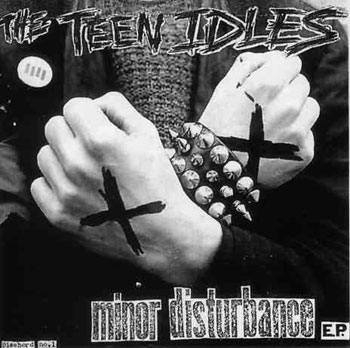
Only in America. Whilst anarchopunks like Crass adopted a huge, all-encompassing vision of the evils of capitalism, spawning a million identikit bands who dressed in black and eschewed meat, puritan punk in the US took an even stranger turn.
The Teen Idles were formed in Washington DC in 1979. The band was composed of teenagers (hence the name) who were unable to attend many local gigs because they were held in ‘over 21s’ venues – a result of the US’ utterly retarded post-prohibition licensing laws.
When the group toured the west-coast in 1980, they encountered a club owner in Los Angeles who was sympathetic to da yoof being admitted to shows, and had begun writing a large “X” on their hands with a permanent marker as a warning to bartenders that such persons should not be served alcohol.
Upon returning home, bassist Ian MacKaye suggested this idea to various DC club owners as a means to allow teenagers into the clubs, while preventing them from being served alcohol. Several began doing so, and the “X” quickly became a badge of pride – even for over 21’s who would have been getting lagered up in a more reasonable society.
MacKaye’s 2nd band, Minor Threat turned this lack of indulgence into a cause celebre with their song “Out of Step”…
I don’t smoke
Don’t drink
Don’t fuck
At least I can fucking think
…and into a mass-movement with their song “Straight Edge”:
I’m a person just like you
But I’ve got better things to do
Than sit around and fuck my head
Hang out with the living dead
Snort white shit up my nose
Pass out at the shows
I don’t even think about speed
That’s something I just don’t need
I’ve got the straight edge
I’m a person just like you
But I’ve got better things to do
Than sit around and smoke dope
‘Cause I know I can cope
Laugh at the thought of eating ludes
Laugh at the thought of sniffing glue
Always gonna keep in touch
Never want to use a crutch
I’ve got the straight edge
Soon a whole heap of kids, on both coasts, were forming bands and not getting off their faces, in a somewhat freakish inversion of punk’s nihilist origins.
Development of the scene – Youth of Today
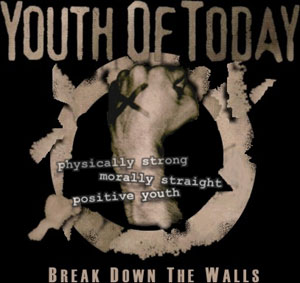
Me you youth crew!
if the world was flat I’d grind the edge
to the positive youth my heart I pledge
X on my hand now take the oath
to positive youth to positive growth
to positive minds, to pure clean souls
these will be all my goals
walk with me and my crew
there is so much shit we can do
and we won’t stop until we’re throughYouth of Today – Youth Crew
Youth of Today formed in 1985 in New York City and are credited with being both prolific and intolerant of non-straight edge behaviour:
“once, when the Dead Kennedys played, I jumped up on stage and grabbed the cigarette from the bass player’s mouth and stomped it into the ground” – Porcell, Youth of Today
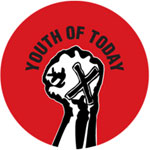
Their songs like preached (and I use the word correctly here) a personal, rather than a political revolution:
“Yeah, when I first got to New York, I hated the scene. Where was the punk, the alternative? I mean, the clothes were dirtier and people had weirder haircuts, but basically they were doing the same thing that every burnout in my high school was doing – listening to music, getting drunk and getting in fights. They reminded me of my older brother, only he’d get plastered and go to Ozzy shows, and the punks would huff glue and go to CB’s. So what was the difference? I had gotten into punk to get away from all that junk in the first place. I think that’s why the whole Straight Edge thing caught on in the city. People were ready for a real alternative. They wanted something with substance, with a message, something that was going to help them rise above their miserable surroundings, not get them deeper into it. And man, Straight Edge caught on like wildfire. It was such an exciting time in New York.” – Porcell, Youth of Today.
The group are credited with creating a confrontational culture in the scene, where despite all the songs about unity, straight-edgers reportedly attacked people at gigs for smoking or having a beer:
You come drunk to the shows
looking for a fight stumble my way
Maybe we might
why do you act that way
I can’t guess take a look at yourself
you’re a mess you say you Wanna fight
We just might
stoned as a zombie your eyes are red
head for the dance floor you’re as good as deadYouth of Today – We Just Might
Needless to say, this did not translate very well across the ocean. When I saw Youth of Today at London’s SOAS in 1989, the bar was doing a roaring trade and there were maybe a dozen recognisably ‘straight’ people in the venue. Amazing stage-diving and OK music, is about all I can remember of it.
Mid to late 80s Straight Edge was criticised for being ‘jock-punk’ (i.e. the clean cut, hooded top sXe’ers would tend to be more fixated on sports and school than subversion).
There are obvious limits to this type of subculture, which we will now (somewhat haphazardly, and indeed, drunkenly) explore. Firstly, the arrival of one band sparked all sorts of controversy, and hilarity.
Crucial Youth
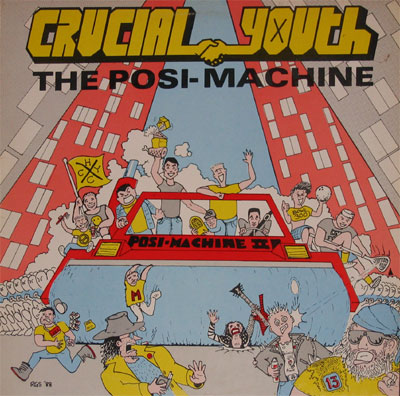
“I used to be nasty and mean
Until I realised the world is one big scene”Crucial Youth – Youth of the World
“Just one beer is all it takes
before your straight edge bends and breaks
Just one beer, there’s no excuse
You should have stuck to drinking juice”Crucial Youth – Just One Beer
Crucial Youth arrived in New Jersey in 1987 “to clean up the scene”. Their first album, The Posi-Machine, and the accompanying interview in Maximum Rock ‘n’ Roll resulted in utter bewilderment, anger and hilarity:
Dear Maximum Rock & Roll and readers,
….My second complaint is lodged at Crucial Youth and the people at MRR who consented to publish such fascistic trash! It is one thing to be and live and practice straightedge philosophy, it is another thing to turn it into facistic dogmatism and shove it down peoples throats! WHO F**+#*CKING DIED AND MADE YOU GODS OF STRAIGHTEDGE?
The songs on the LP dealt with the usual issues of not drinking, or taking drugs:
“When you smoke pot
What have you got?
I’ll tell you what
Not a lot”Crucial Youth – Keep Off The Grass
“Be just like me, and Mr T
Be just like me – DRUG FREE
[blistering version of A-Team theme tune, with voiceover]
“You wanna know why nobody ever dies on the A-Team?
They don’t take drugs
You shouldn’t take drugs either
Make it a good scene… positively!”Crucial Youth – Me & Mr T
…But also featured songs on not drinking caffeine, following the highway code (“Cross on the green – not in between”) and dietary information:
“Everybody listen to Crucial Youth
We’re going to tell you about the four food groups”Crucial Youth – 4 Food Groups
The album was pressed on “milk-white vinyl”. On similar note, straight edge’s “Positive Mental Outlook” was given a re-rub:
“brush away, brush away, brush three times a day,
brush!…I’ve got a positive dental outlook.”Crucial Youth – Positive Dental Outlook
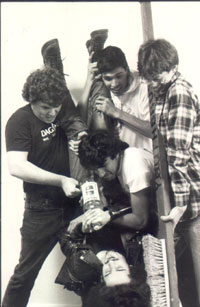
The band’s live shows included a huge “Youth Brush” which they would use on stage to clean up the scene.
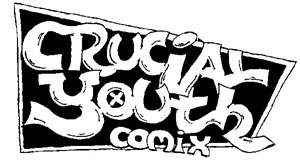
The album came with a series of cartoons which combined straight edge philosophy with Jack Chick-style tracts. Crucial Youth satirised straight edge by pushing its moralism to the limit. This is probably best summed up by their “four rules”:
“Be Straight
Don’t Be Late
Bench Your Weight
Don’t Masturbate”Crucial Youth – 4 Rules
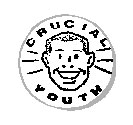
“Scarlet M” developed the last “rule” further by incorporating some freaky (anti) sex education voiceover about suppressing primitive urges, and featuring frenzied vocals about getting hair on your palms. “You said it was ok, but now you do it every single day.”
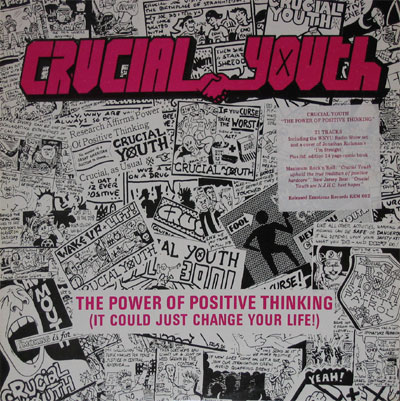
The 2nd LP was a European release incorporating most of the tracks off the first album, but also featuring some new songs which took the Crucial Crew’s philosophy even further. “Be kind – rewind” urged people to return their video cassettes to the rental shop in the correct state.
“Mosh Mosh” was preceded by a band discussion on the creative process behind writing the lyrics, which is slightly less interesting when you realise that they are “Mosh! Mosh!” and nothing more. Crucial Youth, ever health and safety conscious provided some moshin’ “best practice” information as well.
“Those Who Curse” took straight edge bands to task for their potty mouths. “Santa Claus is Coming” from the Crucial Yule EP is one of the album’s final tracks, but unfortunately “Christmas Time for the Skinheads” is absent, so I haven’t heard the band singing:
Everyone’s having the time of their lives
Fighting with snowballs, not bottles and knives
Just like a snowman on a sunny day
White power hatred is melting away…
Satirical bands have necessarily short life-spans, but Crucial Youth certainly achieved their objective of cleaning up the scene in the late 80s.
Curiouser and curiouser
“The whole straight-edge thing for me was never about this kind of puritan lifestyle, where I was supposed to be leading the masses towards a better tomorrow” – Ian MacKaye, 1995
In some ways, Crucial Youth’s ridiculous positions had already been eclipsed by true believers. Youth of Today’s frontman Ray Cappo went on to form Shelter – a “krishnacore” band. Even in YoT he had talked extensively in interviews about meditation, vegetarianism, and his spiritual beliefs.
But even that seemed almost sensible compared to the trajectory of the “Hardline” movement:
“The time has come for an ideology and for a movement that is both physically and morally strong enough to do battle against the forces of evil that are destroying the earth (and all life upon it). One that cannot be bought, nor led astray by temptation. A movement free of the vices that sedate the mind and weaken the body. An ideology that is pure and righteous, without contradictions or inconsistencies. […]
A belief system, and a way of life that lives by one ethic – that all innocent life is sacred, and must have the right to live out its natural state of existence in peace, without interference. This single ethic ensures that all life, from a foetus, or a grown human (black, white, male or female), to an animal, or its habitat, is guaranteed equal rights, with liberty for all, regardless of someone’s personal bias against them. Under the principals of the Hardline ideology, all shall be permitted to do as they please as long as their actions do not harm, in any way, the rights of others.
Any action that does interfere with such rights shall not be considered a “right” in itself, and therefore shall not be tolerated. Those who hurt or destroy life around them, or create a situation in which that life or the quality of it is threatened shall from then on no longer be considered innocent, and in turn will no long have rights.
Adherents to the hardline will abide by these principals in daily life. They shall live at one with the laws of nature, and not forsake them for the desire of pleasure – from deviant sexual acts and/or abortion, to drug use of any kind (and all other cases where ones harms all life around them under the pretext that they are just harming themselves). And, in following with the belief that one shall not infringe on an innocent’s life – no animal product shall be consumed (be it flesh, milk or egg). Along with this purity of everyday life, the true hardliner must strive to liberate the rest of the world from its chains – saving life in some cases, and in others, dealing out justice to those guilty of destroying it.
Only with this dedication, and conviction – living a life that is in harmony with our stated goals and beliefs, gaining strength from out purity of body and mind, while actively opposing those who are guilty destroying the world with their poisonous thoughts, deeds and pollution, can we be victorious in the struggle.”
– Excerpt from the Hardline Manifesto
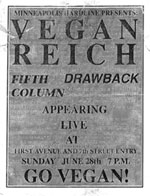
Hardline, as a philosophy, was mainly promulgated by a Tennessee-based band named, with little irony, Vegan Reich. The group were a clear as demonstration as any that the philosophy of straight edge could lead to utter reactionary positions which were more in keeping with evangelical Christian anti-abortionists than punk.
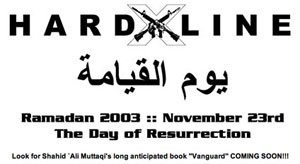
Vegan Reich’s trajectory became even stranger than that when their leading “light” Sean Penn (er, no, not that one) changed his name to Shahid ‘Ali Muttaqi on conversion to Islam. Vegan Reich became Vegan Jihad and Muttaqi put his weight behind the Islamist “Taliyah” movement:
“…the true Mu’min must strive to liberate the rest of the world from its chains – saving life in some cases, and in others, dealing out justice to those guilty of destroying it
Who are the guilty?
Those who hurt or destroy life around them, or create a situation in which that life or the quality of it is threatened shall from then on no longer be considered innocent, and in turn will no long have rights.
They are those who are guilty destroying the world with their poisonous thoughts…
Only through Jihad can true spiritual purity be achieved
Knowing this cannot come to pass while still locked in the chains of Babylon, we strive for justice and liberation by any means necessary. First, through an inward Jihad of self improvement, and spiritual refinement (manifesting in the moral and economic uplifting of our families, community and nation) and secondly, by waging an outward Jihad against the forces of evil that enslave this earth and make universal spiritual awakening impossible.”
As one commetator remarked: “They hope to achieve universal spiritual awakening by shrinking the universe down to one that includes only them.” Those of us who don’t want to inhabit any kind of universe which is run along such lines can take some comfort from Crucial Youth’s humour in the face of fanaticism.
Part Four will follow when I’ve tracked down some decent quality images.

If you’re waiting for a train listening to tunes on your walkman and writing your thoughts down in a notebook, people might assume that you are a REAL trainspotter – writing down numbers of passing diesels.
Certainly a couple of people looked at me funny this morning. (Mind you, that could be for all sorts of reasons).
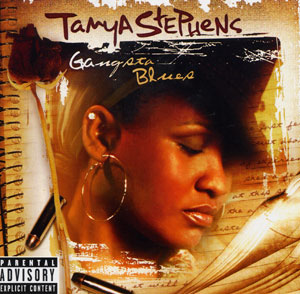
“If you want a collection of played out singles: Don’t buy this Album…
If you want a bunch of recycled lyrics: Don’t buy this Album…
On the other hand, if you’re looking for Innovation and free flowing creative juices prepare to be blown away.”
I would like to reassure my readership that I haven’t given up on all things reggae.
This is my favourite album from 2004, for all sorts of reasons that I can’t really write too much about now because I’ve heard it so many times. It works really well as an album, Tanya shifting between characters and tempos throughout.
She’s trouble, though…
One minute she’s bemoaning the fact that a geezer is already hitched, then a couple of tracks later she’s begging for his wife to “tek him back” ‘cos he’s rubbish! Speaking of rubbish, the Wyclef track is best avoided. The Spragga Benz collaboration is top notch tho – straight up Bonnie & Clyde business.
Check it out…
Part Two: The Apostles
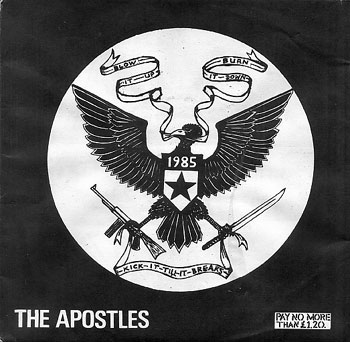
From 1979 onwards, Crass transformed punk, the anarchist movement in the UK, and the nature of protest globally. For better and for worse. There’s enough analysis (pro and con) of all that at the Uncarved critical look at anarchopunk pages.
And whilst not wanting to knock Crass’ contribution too much, it was always painfully obvious that they were mostly middle class: a mate of mine liked their punkier numbers, but had a real problem with more arty stuff like “Reality Asylum” because it reminded him of being told off by his plummy teachers at school. As Garry Bushell once wisely said (you can’t be wrong all the time) “Being middle class, they think that class doesn’t matter.”
The Apostles were a different kettle of fish entirely – formed in Hackney in 1980, more authentically prole than Crass could dream of…
After a number of gigs and cassette releases, their first 7″ Blow it up, Burn it Down, Kick it ’til it Breaks was released in 1983.
The sleeve alone stood out from the usual Crass fare. Yes, the patented black & white sloganeering and fold-out format was present and correct, but no Crass-clone would feature an eagle brandishing a machine gun and machete on the cover! The ‘1985’ emblem was also a statement against Crass’ apocalyptic counting down to 1984 in their catalogue numbers (321984, 221984, 121984 etc). A signifier of hope, and of there being no easy answers…

The articles inside the sleeve were a mixture of classic ranting, analysis, and some very practical information – including articles on breaking into squats and constructing an incendiary device(!).
It’s a serious understatement to say that the Apostles never toed the party line, and got into enough trouble for it over the years.
The “thank yous” section on the sleeve begins “Despite being the one of the most unpopular bands in London at present, probably because we aren’t drug addicts, we aren’t plastic pacifists […] there are, incredibly, a few people who have risked their lives and reputations by actually helping us…”
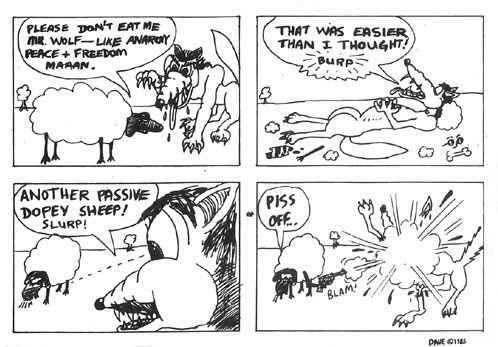
As well as the sheep cartoon, the sleeve of the first 7″ also includes an account of a recent gig:
The Anarchist Speaks (or – free speech as long as you say the right things)
This is a brief true account of an incident at our set at the London Musicians Collective on Jan 22nd 1983. After finishing a number that was supposed to be half way through our set we were approached by the owner of the PA. He had just turned the vocal volume down and said ‘This is a pacifist PA and we didn’t bring it down for you to preach violence’.
So much for free speech. Basically we were asked by the organisers of the gig to come down and play our set, which we intended to do. He was asked to provide a PA. He was not asked to play at being god and decide in his ultimate wisdom what the bands playing should sing about.
If we’re so anti-pacifist, how can it be that 90% of the bands we’ve arranged gigs for have been of the kind that religiously worship pacifism? Obviously to enlarge our egos, or get in with the in-crowd or so we can crawl up the arses of those people who think we’ll be able to use to further our own evil ends. Or maybe even so we can molest some poor innocent gig-goer.
Well at least that’s what some people seem to think. I mean that’s what everyone tells their friends that we do, so it must be true.
Dave Apostle for the ‘Stuff your anarchy up your arse you hypocritical bunch of hippy tramps’ campaign 1983.
In fact, this sort of attitude proved to be very ahead of its time. Bands like Conflict would subsequently dump the holy grail of pacifism (often on purely pragmatic grounds – what do you do if nazi skinheads attack your gigs?) and Crass would, towards the end of their existence as a band, end up advocating damage to property, etc. Pacifism just doesn’t stand up in the cold light of day, and perhaps The Apostles were better placed to recognise this than some of the leading lights of the anarcho punk revolution.
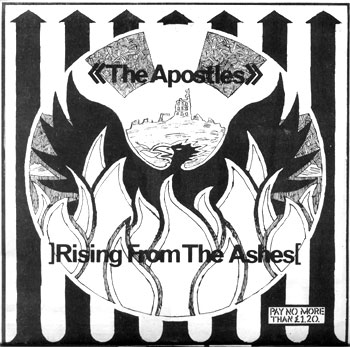
Having slaughtered some of the sacred cows of the scene, the group wasn’t content to provide another easy-to-grasp set of rules to follow. You could never accuse The Apostles of playing it safe… by the time their 2nd 7″ Rising From the Ashes came out, Andy Martin was already plagued by doubts:
“When I read through everything Dave wrote for the first EP cover, I cringe. So does Dave. When I look through Larry’s vast collection of fanzines and I come across one of my anti-punk pro-anarchy and bombs smash the rich articles, I want to disappear into some cloud of obscurity. […] Telling people they should make bombs is/was an irresponsible act of pointless selfishness. Urging people to riot (from the comfort of my safe Islington squat) is equal to urging them to go out and get arrested. What for? My ego?
I went to see Dave one Thursday afternoon in August and I was worried because I thought to myself ‘Oh fuck. Dave won’t like what I’ve done for the second EP cover. He’ll accuse me of turning into a Crass clone.’ But when I eventually brought up the subject, he didn’t grab me by the neck and knock me into next door’s bomb factory (joke!) or GROWL like I expected him to – he breathed a sigh of relief and said: ‘I was getting really pissed off. I felt like I’d have to put some boots, guns and bombs on the cover to keep you happy.”
The tunes on the 2nd EP dealt with racism (which was surprisingly uncommon in the early days of anarchopunk, far better to sing about impending nuclear annihilation!), a broken relationship (the excellent “Swimming in the Sea of Life” which ia a definite lost classic) an instrumental (again, few other Crass-clones did them), patronising the disabled, plus “Class War” and “The Stoke Newington 8” which dealt positively with violent revolution and the people imprisoned for the Angry Brigade bombings…
Texts on the sleeve included information on the economics and detail of pressing your own record, animal rights, state of the punk scene, “Help your local community – shoot a junkie”, black on white racism, a dissection of a recent Garry Bushell article on the group, and huge swathes of other stuff. There was more text on most Apostles record covers than in most fanzines. And they were doing their own fanzine (called ‘Scum’) as well!
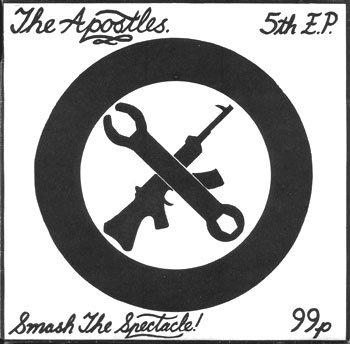
It seemed like the Apostles were agonisingly hardcore about rethinking everything, every day – almost to the point of schizophrenia. The 5th EP includes a note from Andy explaining that Dave had boycotted the studio sessions for the record because Andy had written “hello Skrewdriver!” on the sleevenotes to their previous single, as a (admittedly puerile) wind up to the holier-than-thou anarcho hordes.
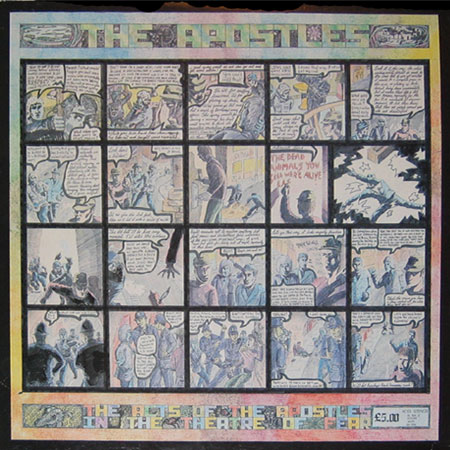
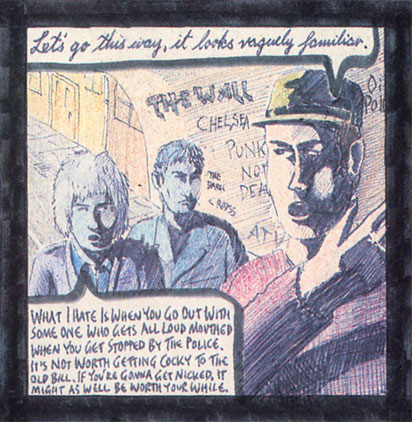
The cartoon format continued to be championed – the whole cover of their 3rd LP The Acts of the Apostles in the Theatre of Fear was a practical story about the pitfalls of carrying out criminal damage of an evening (er, as you do).
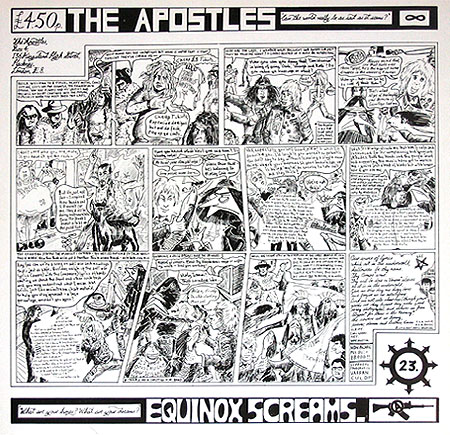
The 5th LP Equinox Screams had a cartoon slagging off the hero worship of heavy metal fans on the cover. I have no idea why. It also managed to lose the group their entire fanbase in one fell swoop because of the lyrical content. A checklist:
Aleister Crowley poem
HP Lovecraft Invocation
“Rock Against Communism”
A Throbbing Gristle cover
“Kill or Cure” – on, ah, ‘queers’
“Rights for Whites”
“Nazi Baby” – a weird pisstaking love song ‘you’re a nazi baby – your anatomy could never flatter me’
So – a white power / Daily Mail / homophobic / occult / industrial / arty mash up from your favourite gay anarchopunk band!
In the 80s ideology ruled – and was often bought ‘off the peg’. Getting an Apostles record was like grabbing a box of cornflakes from the supermarket – only to find it filled with dog biscuits when you opened it up over breakfast.
Unsurprisingly, hardly anybody would have anything to do with the group after this, though there is some explanation in the interview with Homocore on uncarved.org – about playing with belief, taking on a persona to see what happens – artistic licence.
This blog entry has mainly focussed on the artwork and politics, but The Apostles also recorded some classic songs – I’ll try and come back to them at some point in the future.
At some point in the late 80s the Apostles ended and Academy 23 began. Academy 23 recorded a number of cassettes, records and CDs with a dizzying array of genres – punk, industrial, scottish folk songs, you name it.
Academy 23 eventually mutated into UNIT, who are still very much a going concern. Over 20 years and still going strong, and still winding up all-comers from what I’ve heard…
Apostles and Academy 23 CDs, tapes and vinyl are stil available from BBP Distribution
UNIT have just set up a prototype website as well: http://www.unit-united.co.uk/
Part Three in the series will follow…
Neil Fraser aka Mad Professor on 24 years in the business, his Grammy nomination, some historical perspective for today, and some new releases.
Well, it’s been hinted at for a while now, but here goes:
The best way to finish the week!
After this…
…and then this…
The latest news, hot of the press, is that Comrade Dubversion is a fresh out of court and has had his case thrown out by the judge, who noted that “independent witness accounts offered nothing that was consistent with the officer’s statement”.
I’ll let you read into that one what you will.